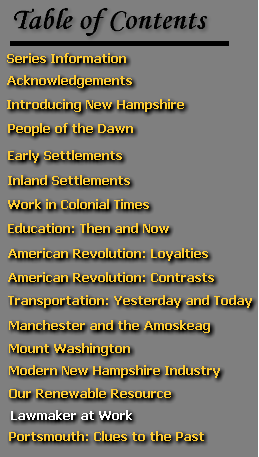SUMMARY
 Patti
Blanchette is a State Representative from Newmarket, New Hampshire. She
is twenty-seven, a law student at Franklin Pierce College in Concord, and
is serving her second term in the House. Patti works very hard at her job
as Representative. In this lesson, she describes, in her own words, what
her duties are as an elected representative of her neighbors in Newmarket,
how she ran for the position, how much time she spends listening and talking
with the people who sent her to Concord to speak for them. This visual
presentation follows Patti as she goes about her work researching, debating,
lobbying, and making our laws in the State House in Concord. Patti
Blanchette is a State Representative from Newmarket, New Hampshire. She
is twenty-seven, a law student at Franklin Pierce College in Concord, and
is serving her second term in the House. Patti works very hard at her job
as Representative. In this lesson, she describes, in her own words, what
her duties are as an elected representative of her neighbors in Newmarket,
how she ran for the position, how much time she spends listening and talking
with the people who sent her to Concord to speak for them. This visual
presentation follows Patti as she goes about her work researching, debating,
lobbying, and making our laws in the State House in Concord.
Scenes of the lesson include:
Patti during her campaign
to be elected--stuffing envelopes, making phone calls, talking to people
on the streets of Newmarket.
A House Committee at work
in a hearing, listening to and discussing issues.
The informal meetings in
the hallways of the Capitol, where so much business is accomplished in
the qovernmental process.
Arguments on the floor of
the House as controversial bills are hotly debated, but always in the formal
control of Parliamentary procedure.
A meeting in the Governor's
Council Chambers.
A visit to Concord and a
garden reception for Roslyn Carter.
How a bill starts out as
an idea or need someone or a group came up with. How Patti considers and
researches the proposal, and presents it or supports it on its way before
the rest of the House and Senate.
Patti at home and at law
school.
This very personal approach
to State Government strives to show students that the people who speak
for them in government are people like themselves, their parents and their
neighbors. They see that it is possible for them to run for this position
and become a State Representative. The lesson shows, in short, that in
New Hampshire, government is accessible to everyone.
Examining its operation from
the inside through Patti's own personal experiences as a legislator, students
are also exposed to the mechanics of State Government. As the students
follow Patti up the steps of the Capitol, through the Hall of Flags, into
a committee room, into the House and the Senate Chambers, they are given
a visual tour of the Capitol. The exterior shots include the Capitol grounds,
the statues and gardens, the Legislative Office Building, and an assortment
of other visual experiences that show our State Capitol at work.
OBJECTIVES
1. To help students
experience the human side of government and lawmakers.
2. To foster an interest
in future participation in government by depicting lawmaking as an on-going
process which is accessible to everyone.
3. To help students
understand the need for rules, regulations and laws as they affect individual
needs, family life, neighborhood relations and state functions.
4. To offer students
a glimpse of the lives and responsibilities of state policy-makers.
5. To give students
an understanding of the New Hampshire state government, its functions and
services, as seen through the experiences of an active legislator.
6. To present students
with a variety of visual experiences, including a tour of the Capitol,
which shows their capitol at work.
PRE-VIEWING ACTIVITIES
1. Ask students if
they know who the legislator is in their town. What are this person's responsibilities?
2. What is a law?
Why does a community or a state need laws?
3. Discuss the need
to have rules in your school and classroom. Compare these with the need
for rules in the operation of a state.
4. Have any of the
students visited either the state or U.S. Capitol? If so, have them describe
their trip.
5. Discuss why laws
are important to our lives. Think of some laws that affect you.
6. Discuss the rules
that operate in your family and/or your neighborhood.
7. Imagine what it
would be like without any rules and regulations:
in the air
on the ground
on the sea
in your family
in your neighborhood
in your classroom
in sports
8. Discuss some of the
key vocabulary words from Words to Know..
9. In private, jot
down some of the rules and regulations that you place on yourself. On a
voluntary basis, share them with other class members.
10. Ask your parents/grandparents
what family and community rules they live/lived by. Compare and contrast
them with your own.
POST-VIEWING ACTIVITIES
1. Ask your town legislator
to visit the class and describe what he/she does in the legislature.
2. Study your town's
government. Have students role play in a town meeting or city council session.
Have a town official visit class and talk about town government.
3. Think of a new
law you would like to see passed or an old one you'd like repealed or amended.
What would you do to have this bill reach the legislature? Role play, with
some students as legislators, senators, members of Governor's Council,
and someone as Governor. Depict what happens as a bill becomes law.
4. What is the role
of women in the New Hampshire government? Find out how many women are in
the House, the Senate, and the Governor's Council.
5. Pretend you are
in the legislature. Write an article about the legislature and its function
for a newspaper.
6. Visit the New Hampshire
State Capitol.
7. Attend a legislative
session, town meeting, or a meeting of your county commission or local
planning board.
8. Write a play/skit
depicting one day without laws:
in your family
in your neighborhood/community
in your classroom/school
in a state park
in a sport
9. Do a research paper
on women's suffrage efforts and/or the struggles of other minorities to
participate in lawmaking.
10. Ask the class
to develop a set of workable rules for your classroom. Include penalty
plans for classroom violations.
11. Find out what
issues/bills are presently pending in your community, in the State, in
the nation that directly affect you. Write a letter to the appropriate
legislator expressing your views on the matter.
12. Investigate some
law violations and penalties that accompany them.
13. Investigate the
functions of branches of state and/or federal government.
14. Make a class mural
or other visual display of how a bill becomes a law.
15. Make a collage
or photographic display which would depict what it would be like to live
without rules. For example: in a state park, show things like the litter,
fire damage, and broken foliage, that might result from complete freedom.
16. Make a map of
the U.S. showing the locations of each state capitol.
17. Pretend your class
is shipwrecked on a desert island with limited food, clothing and shelter.
Design a minimum set of rules that, if observed, would guarantee your survival
for 10 days or so.
18. In small groups,
analyze the meaning of the amendments to the State Constitution or U.S.
Constitution.
19. Brainstorm some
of the reasons why crime has been increasing. Brainstorm some solutions.
20. Discuss the meaning
of "civil disobedience," its consequences and alternatives.
21. Do a report on
juvenile justice issues: i.e., your rights, laws, penalties.
VOCABULARY
-
regulations
-
Governor's Council
-
bill
-
US Congress
-
State Constitution
-
representatives
-
state legislature
-
amendment
-
hearing
-
city council
-
legislators
-
appointment
-
town meeting
-
General Court
-
executive
-
laws
-
State Senate
-
Capitol
-
majority
-
senator
-
session
-
Parliament
-
invention
-
nomination
-
appointment
-
minority
WEB RESOURCES
|




